This is a fun AAR to follow. The knife-edge you've trodden just in the first few updates makes me very nervous. Those Europeans were playing pass-the-parcel with you for a while there, eh? Looking forward to getting your revenge on 'The Romans' some day 
Tunis Delenda Est
- Thread starter Selzro
- Start date
-
We have updated our Community Code of Conduct. Please read through the new rules for the forum that are an integral part of Paradox Interactive’s User Agreement.
You are using an out of date browser. It may not display this or other websites correctly.
You should upgrade or use an alternative browser.
You should upgrade or use an alternative browser.
Sprites – That’s the general idea, but Tunis will never surrender!
WelshDude – Thanks for the stats. As you can see here, already in 1849 almost half my population was part of some militant group, while the army is a mere 18,000 men strong:

Later in the game (late ‘50s), the average militancy reached 9 but there was still no uprising. I must have been very lucky.
AllmyJames – Revenge is a dish best served cold. Tunis may appear to forget but it will never forgive.
badger_ken – It should be, but it’s more dramatic and euro-centric this way.
WelshDude – Thanks for the stats. As you can see here, already in 1849 almost half my population was part of some militant group, while the army is a mere 18,000 men strong:

Later in the game (late ‘50s), the average militancy reached 9 but there was still no uprising. I must have been very lucky.
AllmyJames – Revenge is a dish best served cold. Tunis may appear to forget but it will never forgive.
badger_ken – It should be, but it’s more dramatic and euro-centric this way.
Chapter IV – New Flag, New Hope
The constitution of 1850 changed Tunisian society drastically. Never since the days of Carthage had the nobles of the land enjoyed such political liberty. To mark the occasion, a new flag was adopted, just as the first elections were called.
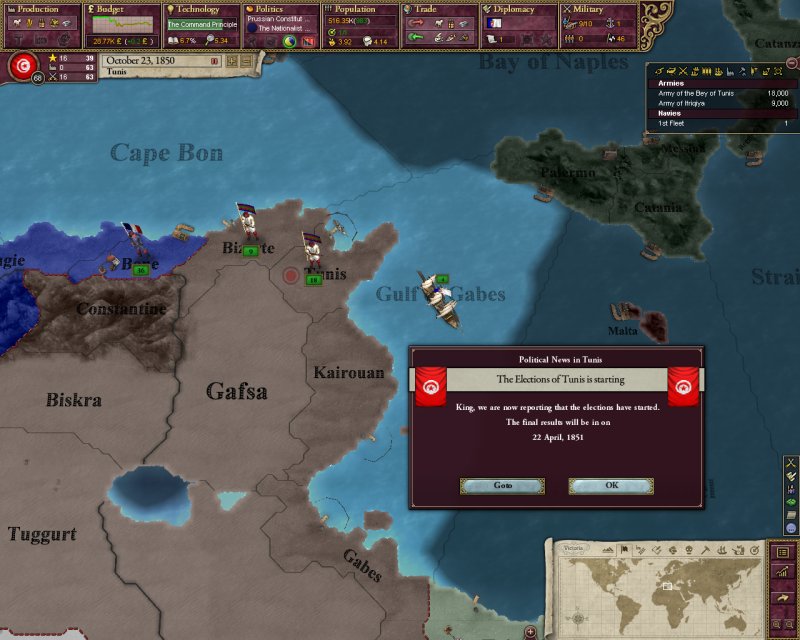
As the country remained under blockade and its democratic institutions were still rough, it was little wonder that the ruling Nationalist Faction won with 100% of the vote.
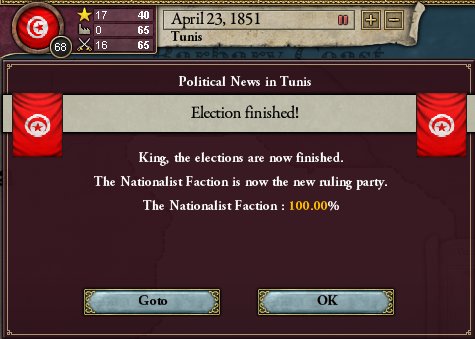
The government, after this vote of confidence, proceeded to form Tunis’ first artillery brigade, which was attached to the Army of the Bey of Tunis in July 1851. There was still no sign of Portuguese troops, and they remained a Class 2 threat until November 1852, when they backed away from the war, signing a white peace with Tunis.
Relief soon turned to anxiety, since there was no telling which European nation would see its opportunity to invade now. Two Sicilies had been quiet for too long, and Spain was a potential threat that might very well surpass Class 3. For over a month, the palace and parliament waited in trepidation, until near the end of the Christian year, a diplomat made his way to the Bey, with an unmistakably serious expression on his face. As he walked, a crowd of officials and courtiers gathered to watch and whispered intently until one of them recognized the diplomat as a Swede. Identification being made, the jubilant chant “Class 1! Class 1!” started spreading across the crowd, who applauded the perplexed northerner as he made his way to the Bey. He nudged his local interpreter and asked him in French,
“What are they all chanting?”
The interpreter, struggling to find the right words, answered,
“They say, you number one! Number one!”
The Swede smirked.
“Huh! Those Mohammedans know their place. Let’s get this over with. I’m sure this squalid little country will be much better under Swedish management.”
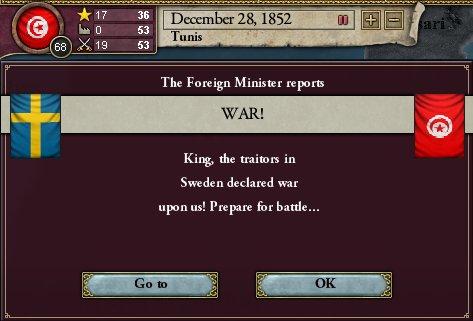
The 7th War of the Constantine Region Concession was like a breath of fresh air for Tunis. War exhaustion had exceeded 40% following the last three wars and militancy was on the rise. But, relatively speaking, Tunis was doing well by default, since it was the only one of the Barbary States still ruling itself.
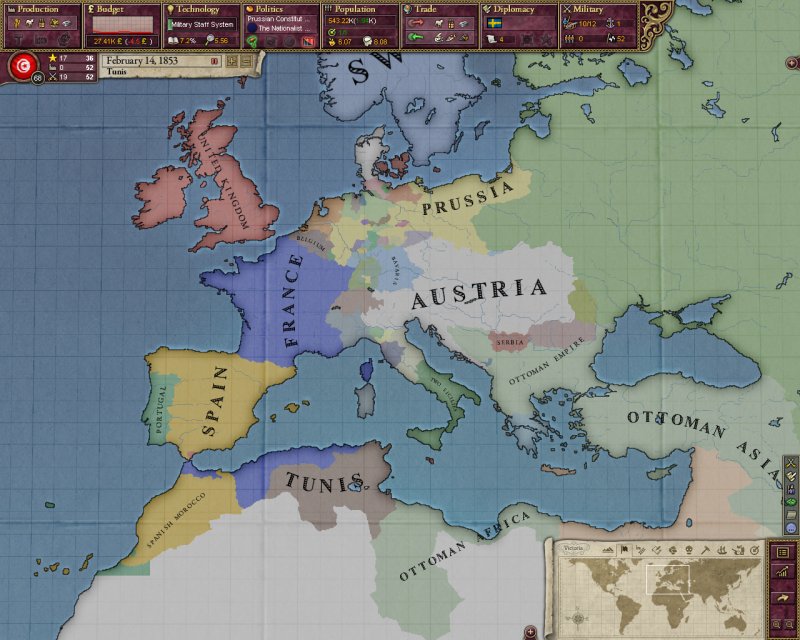
During that phoney war, the nation’s health care system was expanded twice (in January and June 1853) and the vote was extended to the middle class, under a weighted system (March 1854). Both measures were intended to placate the people, whose militancy was reaching record highs. A few weeks after that, Sweden made peace, and Tunis found itself once again in an uncertain diplomatic situation.
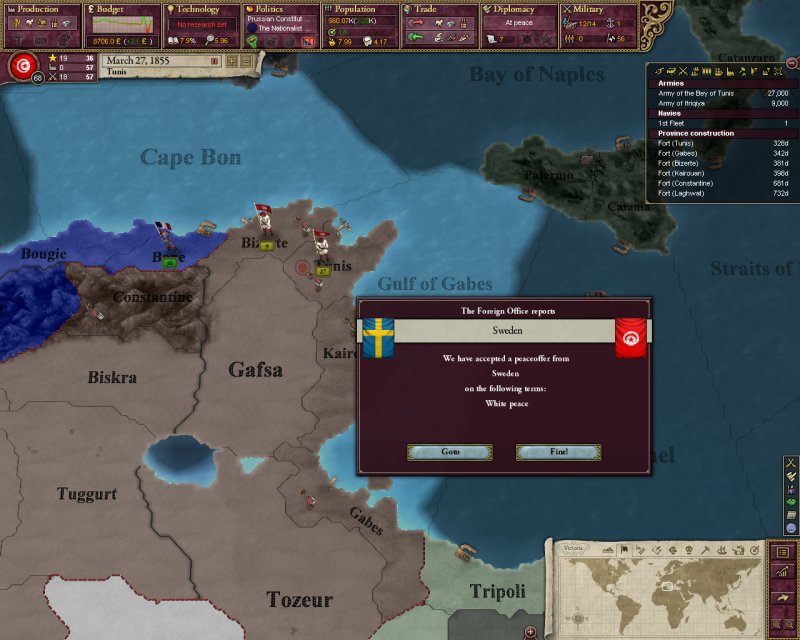
Confounding that situation was the death of Ahmed Bey, on May 30, 1855. He was succeeded by his cousin, Muhammad II ibn al-Husayn (known as Mohammed Bey to Europeans), in a ceremony that coincided with the calling of the second national elections. Ahmad had seen the expansion of Tunis in Algeria and its successful defence against 6 European nations in 8 colonial wars; also the foundation of a welfare state and the transition to a more representational system of government; finally the strengthening of the army and the modernization of its tactics, as well as the streamlining of the economy and the doubling of Tunis’ literacy rate. His successor had big shoes to fill and a strong legacy to uphold.
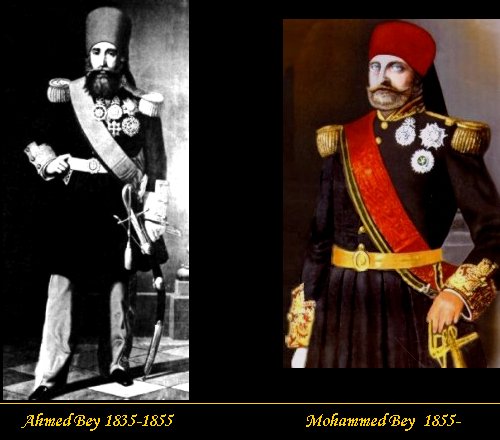
The constitution of 1850 changed Tunisian society drastically. Never since the days of Carthage had the nobles of the land enjoyed such political liberty. To mark the occasion, a new flag was adopted, just as the first elections were called.

As the country remained under blockade and its democratic institutions were still rough, it was little wonder that the ruling Nationalist Faction won with 100% of the vote.

The government, after this vote of confidence, proceeded to form Tunis’ first artillery brigade, which was attached to the Army of the Bey of Tunis in July 1851. There was still no sign of Portuguese troops, and they remained a Class 2 threat until November 1852, when they backed away from the war, signing a white peace with Tunis.
Relief soon turned to anxiety, since there was no telling which European nation would see its opportunity to invade now. Two Sicilies had been quiet for too long, and Spain was a potential threat that might very well surpass Class 3. For over a month, the palace and parliament waited in trepidation, until near the end of the Christian year, a diplomat made his way to the Bey, with an unmistakably serious expression on his face. As he walked, a crowd of officials and courtiers gathered to watch and whispered intently until one of them recognized the diplomat as a Swede. Identification being made, the jubilant chant “Class 1! Class 1!” started spreading across the crowd, who applauded the perplexed northerner as he made his way to the Bey. He nudged his local interpreter and asked him in French,
“What are they all chanting?”
The interpreter, struggling to find the right words, answered,
“They say, you number one! Number one!”
The Swede smirked.
“Huh! Those Mohammedans know their place. Let’s get this over with. I’m sure this squalid little country will be much better under Swedish management.”

The 7th War of the Constantine Region Concession was like a breath of fresh air for Tunis. War exhaustion had exceeded 40% following the last three wars and militancy was on the rise. But, relatively speaking, Tunis was doing well by default, since it was the only one of the Barbary States still ruling itself.

During that phoney war, the nation’s health care system was expanded twice (in January and June 1853) and the vote was extended to the middle class, under a weighted system (March 1854). Both measures were intended to placate the people, whose militancy was reaching record highs. A few weeks after that, Sweden made peace, and Tunis found itself once again in an uncertain diplomatic situation.

Confounding that situation was the death of Ahmed Bey, on May 30, 1855. He was succeeded by his cousin, Muhammad II ibn al-Husayn (known as Mohammed Bey to Europeans), in a ceremony that coincided with the calling of the second national elections. Ahmad had seen the expansion of Tunis in Algeria and its successful defence against 6 European nations in 8 colonial wars; also the foundation of a welfare state and the transition to a more representational system of government; finally the strengthening of the army and the modernization of its tactics, as well as the streamlining of the economy and the doubling of Tunis’ literacy rate. His successor had big shoes to fill and a strong legacy to uphold.

lol Good lord, that's an awful lot of countries that really like your patch of desert! Great job in keeping them all out so far.
Hehe! A class system for European DoW, love it! Fair enough too.. It seems a doorstep to Africa is a popular prize in Europe. Here is to hoping that the French are indeed going to be if not benevolent at least peaceful sphere masters. I wouldn't say Abu Dhabi is harder.. I have had the luxury of peace for many years as well as relatively high literacy. You don't have the luxury of either and have had to beat off soooooo many advances from Europe already. At least all those blockades haven't been for naught.. plenty of reform to show from them.
The "fight war, get war exhaustion, become the most liberal country in the world" gambit eh? Interesting.
In V1, at least, Africa could be a viable immigration centre by virtue of its closeness to Europe. I wonder if this would be possible again in V2?
I've noticed that your beys all look remarkably similar...
I've noticed that your beys all look remarkably similar...
GuileMike - They are! But, fortunately for me, that doesn't include France, otherwise this AAR would have been a lot shorter... Thanks for reading!
Melrick - Thanks! Who knew landlocked Constantine Region would be so attractive?...
Kaltorak - The French are going to prove useful, as you will soon see. I'm not sure about Abu Dhabi - I've been fighting off multiple European invasions but for Abu Dhabi even the weakest Class III would count as a fatal Class IV... I hope it can westernize soon in your AAR.
Arilou - It wasn't by choice, or even planned, but the reforms that I've had to pass to keep the people at least reasonably militant are proving a nice bonus. Thanks for reading!
Tanzhang (譚張) - It was a small update, and I kept the Swedes at war with me a little bit more than I'd usually do (previously I accepted any peace offer within weeks, because I considered it an exploit to keep a phony war going indefinitely, but this time I dragged it on for a couple of months), but the geopolitical situation will soon change.
KlavoHunter - Thanks! Next chapter coming up...
AllmyJames - My beys have good reason for looking similar - they are historical and all part of the same family. I've also kept their historical death dates. I found their portraits/photographs in Wikipedia. I haven't noticed any immigration from Europe but my health care reforms have resulted in a large rate of population increase.
WelshDude - I've only used NFs for bureaucrats and clergymen, in my two states, trying to improve both classes with some balance (most of the time the NFs are set on clergymen).
Alfredian - I'm friendly, so I'm close. Also, no other GP is competing with France over me, so no influence is wasted on discrediting nations or bannind diplomats.
Melrick - Thanks! Who knew landlocked Constantine Region would be so attractive?...
Kaltorak - The French are going to prove useful, as you will soon see. I'm not sure about Abu Dhabi - I've been fighting off multiple European invasions but for Abu Dhabi even the weakest Class III would count as a fatal Class IV... I hope it can westernize soon in your AAR.
Arilou - It wasn't by choice, or even planned, but the reforms that I've had to pass to keep the people at least reasonably militant are proving a nice bonus. Thanks for reading!
Tanzhang (譚張) - It was a small update, and I kept the Swedes at war with me a little bit more than I'd usually do (previously I accepted any peace offer within weeks, because I considered it an exploit to keep a phony war going indefinitely, but this time I dragged it on for a couple of months), but the geopolitical situation will soon change.
KlavoHunter - Thanks! Next chapter coming up...
AllmyJames - My beys have good reason for looking similar - they are historical and all part of the same family. I've also kept their historical death dates. I found their portraits/photographs in Wikipedia. I haven't noticed any immigration from Europe but my health care reforms have resulted in a large rate of population increase.
WelshDude - I've only used NFs for bureaucrats and clergymen, in my two states, trying to improve both classes with some balance (most of the time the NFs are set on clergymen).
Alfredian - I'm friendly, so I'm close. Also, no other GP is competing with France over me, so no influence is wasted on discrediting nations or bannind diplomats.
Chapter V – France to the Rescue
In June, the Netherlands declared war, to avenge their previous defeat. The nation, under its new Bey and with elections still pending, prepared for a serious Class 3 threat but then something amazing happened. France decided to intervene on the side of Tunis!
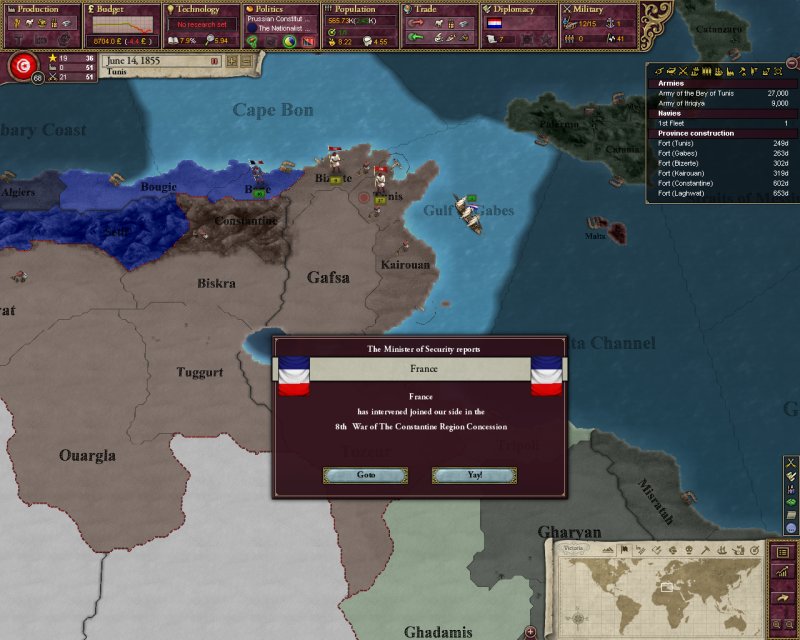
The Dutch blockading squadron retreated, in the wake of the French navy, and the elections in October led to another unchallenged Nationalist victory (100% of the vote). France took the fight to the Dutch colonies, removing any semblance of threat from North Africa, but curiously that led to a flare-up of anti-western sentiment in Tunis. By 1856, militancy had reached record levels, maxing out in many provinces.
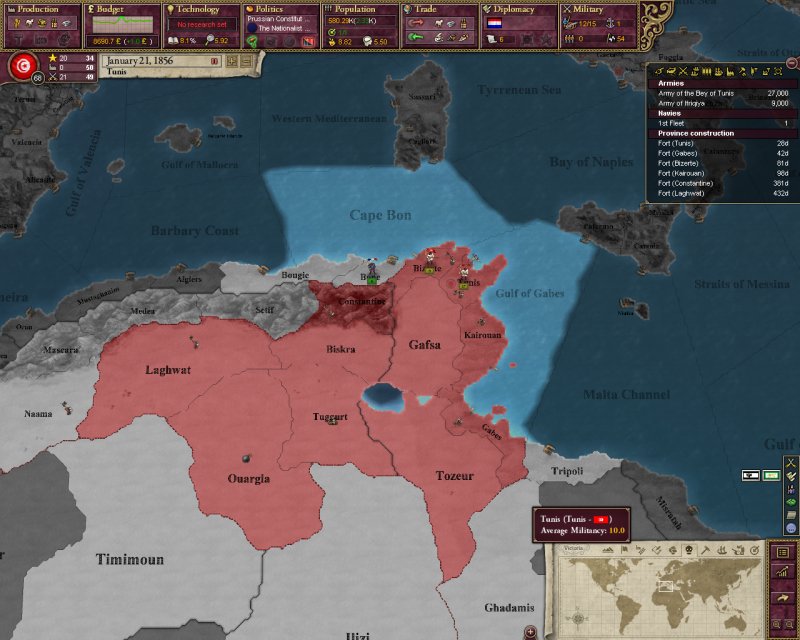
The enactment of a good health care reform did little to appease the people, while France demanded a legation quarter, which the Tunisian government was in no position to refuse. The people were not pleased.
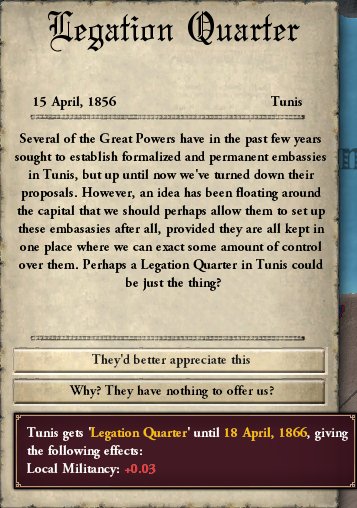
In November 1856, France and the Netherlands negotiated a white peace, and it seemed like that would be the end of European threats to Tunis.
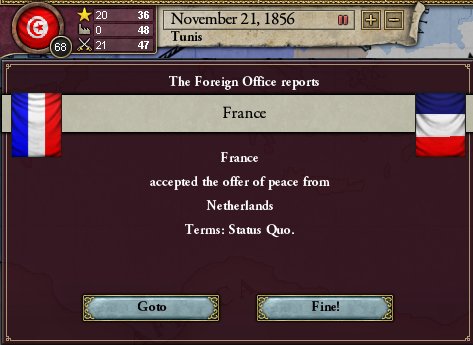
That was soon proved mistaken, as Spain declared war in December (with relations with France at 99.7).
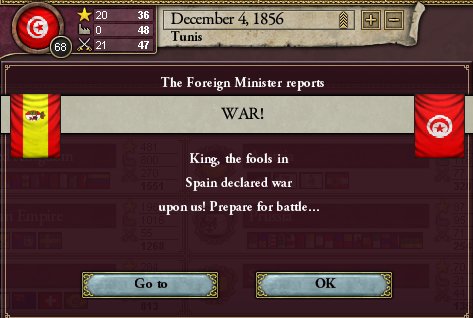
Spain was a power to be feared, and if Tunis was up against it on its own, victory would have been very difficult, but France once again came to the rescue, and attacked the Spanish in their home territories and in Spanish Morocco. But not before the Spanish had landed an expeditionary force in Bizerte.
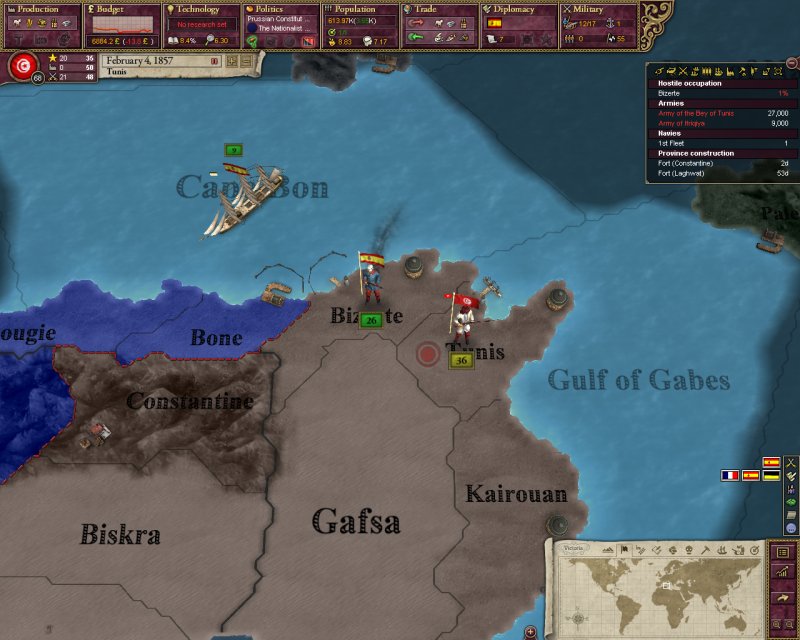
There were no French forces nearby, and the Tunisian government considered it a matter of honour to show that Tunis could defend itself. Besides, much had been invested in the past years to increase the skill and professionalism of Tunisian troops, and their officers were eager to test themselves in battle. So, the whole Tunisian army, 36,000 men strong, including two brigades of artillery and one brigade of cavalry, was led by general Nur al-Din al-Annabi, a skilled attacker, against the Spanish positions.
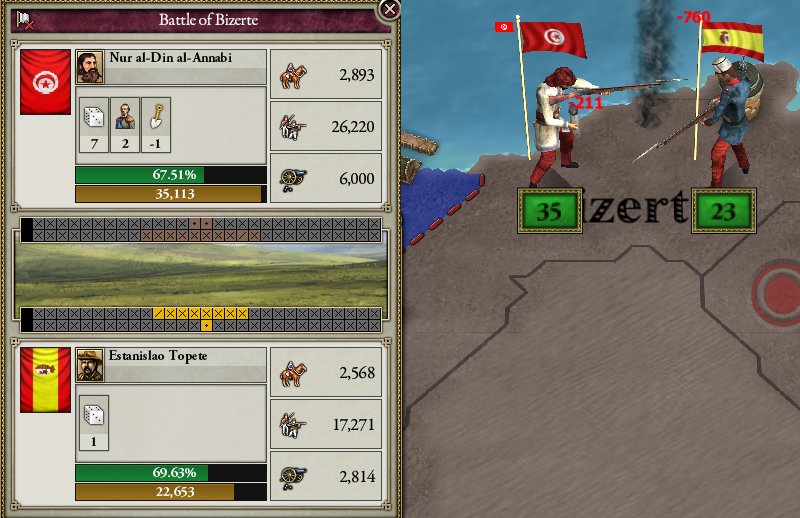
The enemy put up a spirited fight, but in the end the Tunisians were victorious.
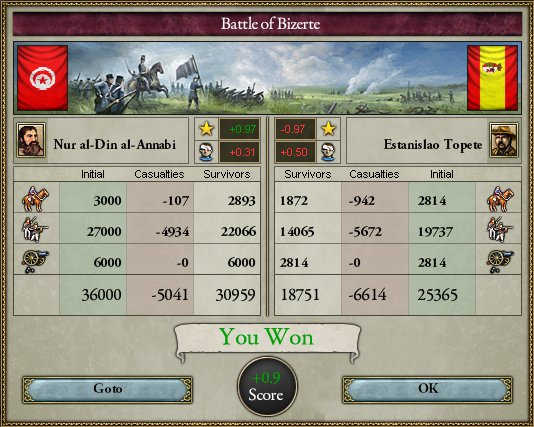
As the Spanish retreated into French Algeria, the Tunisian government enacted a series of legislations that formalized minimum safety regulations and a 14 hour workday. Those measures made living conditions easier for the rapidly rising population of Tunisia, while their adverse effects were unnoticeable in the absence of industry.
In 1858, France made peace with Spain, ending the 9th War of the Constantine Region Concession. War exhaustion in Tunisia was 38%, but in July of that year it could look forward to some years of peace and recovery, as France pulled the country into its sphere of influence.
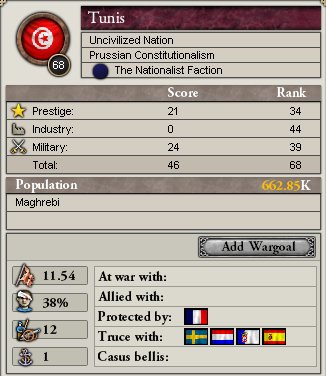
The only dark patches of Mohammed Bey’s reign came in the summer of 1859. The French ambassador was murdered, infuriating Tunis’ protectors. Mohammed issued a formal apology but refused to take any steps that would leave a lasting source of shame on Tunis.
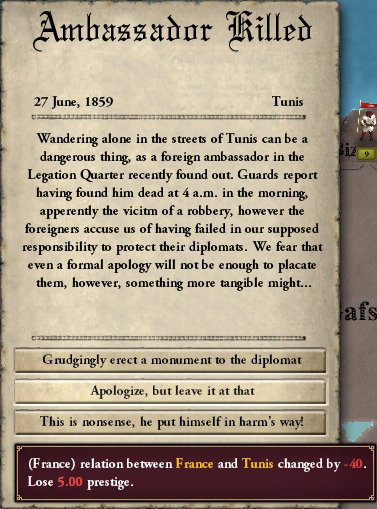
Even so, the nation lost much prestige and it came as a double shock when the new ambassador met the same gruesome fate just weeks later!
Mohammed Bey died on 22 September 1859, having become infirm after those repeated blows to Tunis’ prestige. He was succeeded by Muhammad III as-Sadiq (Sadok Bey to the Europeans). The nation may have lost half of its hard-earned prestige in a most insidious manner, but it was now for the first time safe, under a mild French protection that did not extend to meddling in the affairs of the government. Tunis had survived the worst. Now it was time to rebuild, and plan for the future.
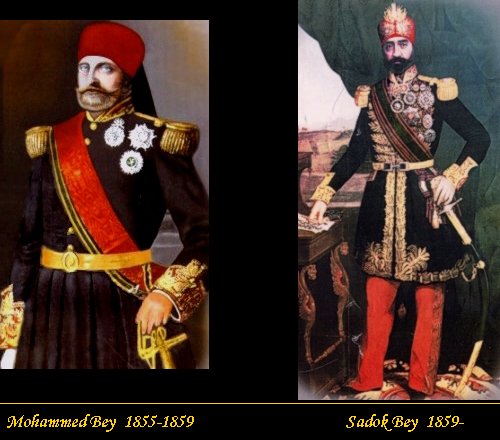
In June, the Netherlands declared war, to avenge their previous defeat. The nation, under its new Bey and with elections still pending, prepared for a serious Class 3 threat but then something amazing happened. France decided to intervene on the side of Tunis!

The Dutch blockading squadron retreated, in the wake of the French navy, and the elections in October led to another unchallenged Nationalist victory (100% of the vote). France took the fight to the Dutch colonies, removing any semblance of threat from North Africa, but curiously that led to a flare-up of anti-western sentiment in Tunis. By 1856, militancy had reached record levels, maxing out in many provinces.

The enactment of a good health care reform did little to appease the people, while France demanded a legation quarter, which the Tunisian government was in no position to refuse. The people were not pleased.

In November 1856, France and the Netherlands negotiated a white peace, and it seemed like that would be the end of European threats to Tunis.

That was soon proved mistaken, as Spain declared war in December (with relations with France at 99.7).

Spain was a power to be feared, and if Tunis was up against it on its own, victory would have been very difficult, but France once again came to the rescue, and attacked the Spanish in their home territories and in Spanish Morocco. But not before the Spanish had landed an expeditionary force in Bizerte.

There were no French forces nearby, and the Tunisian government considered it a matter of honour to show that Tunis could defend itself. Besides, much had been invested in the past years to increase the skill and professionalism of Tunisian troops, and their officers were eager to test themselves in battle. So, the whole Tunisian army, 36,000 men strong, including two brigades of artillery and one brigade of cavalry, was led by general Nur al-Din al-Annabi, a skilled attacker, against the Spanish positions.

The enemy put up a spirited fight, but in the end the Tunisians were victorious.

As the Spanish retreated into French Algeria, the Tunisian government enacted a series of legislations that formalized minimum safety regulations and a 14 hour workday. Those measures made living conditions easier for the rapidly rising population of Tunisia, while their adverse effects were unnoticeable in the absence of industry.
In 1858, France made peace with Spain, ending the 9th War of the Constantine Region Concession. War exhaustion in Tunisia was 38%, but in July of that year it could look forward to some years of peace and recovery, as France pulled the country into its sphere of influence.

The only dark patches of Mohammed Bey’s reign came in the summer of 1859. The French ambassador was murdered, infuriating Tunis’ protectors. Mohammed issued a formal apology but refused to take any steps that would leave a lasting source of shame on Tunis.

Even so, the nation lost much prestige and it came as a double shock when the new ambassador met the same gruesome fate just weeks later!
Mohammed Bey died on 22 September 1859, having become infirm after those repeated blows to Tunis’ prestige. He was succeeded by Muhammad III as-Sadiq (Sadok Bey to the Europeans). The nation may have lost half of its hard-earned prestige in a most insidious manner, but it was now for the first time safe, under a mild French protection that did not extend to meddling in the affairs of the government. Tunis had survived the worst. Now it was time to rebuild, and plan for the future.

congratulations on the glorious victory at bizerte!
Entering the French SOI should be lovely - how close are you to westernization, technologically (looks like prestige and MIL still have a ways to go...)
Entering the French SOI should be lovely - how close are you to westernization, technologically (looks like prestige and MIL still have a ways to go...)
This is indeed a challenging AAR to do but you are doing it swimmingly my good chap
Thanks Aliasing! badger_ken, I only need a couple of easily researchable technologies for westernization but, as you said, prestige and mil will be more difficult. I've got a cunning plan* to get some easy prestige quickly (it's currently 11), but it should take many years before the other condition is met...
*Okay, the plan is not that cunning - I'm basically saving RPs for the next philosophy tech - but it's a tried and true method.
*Okay, the plan is not that cunning - I'm basically saving RPs for the next philosophy tech - but it's a tried and true method.
Thanks Aliasing! badger_ken, I only need a couple of easily researchable technologies for westernization but, as you said, prestige and mil will be more difficult. I've got a cunning plan* to get some easy prestige quickly (it's currently 11), but it should take many years before the other condition is met...
*Okay, the plan is not that cunning - I'm basically saving RPs for the next philosophy tech - but it's a tried and true method.
yeah, getting the MIL score high enough to westernize can drive ya crazy. My only advice, which I 'm sure you've already considered, is to crank military spending as high as you can, and/or build men-of-war.
Great, another AAR that I'll be reading at night. This looks like awesome stuff though. I would love to try something as brave sometime (or was it stupid?). Good luck against the Europeans!

